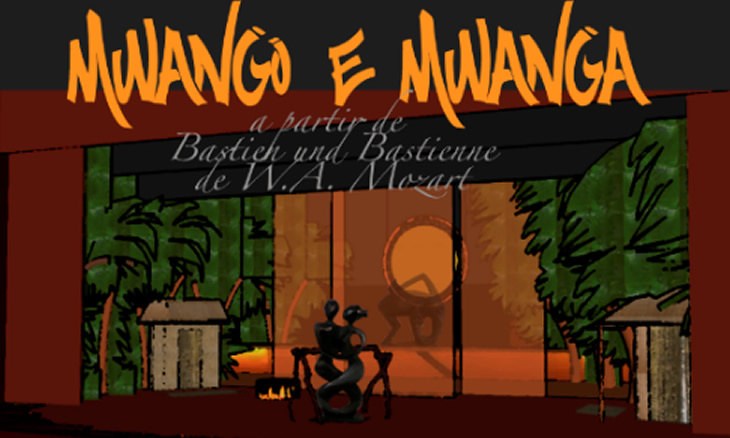Mozambique: UEM hosts World Photography Day celebration
A Mozambican Mozart: Today is the day ‘Bastien und Bastienne’ turns into ‘Mwango e Mwanga’

Photo: ECA /UEM
The Eduardo Mondlane University School of Communication and Arts (ECA) closes the 2018 academic year with the “Mwango and Mwanga from Bastien und Bastienne” by W. A. Mozart.
The show, out on by students and teachers of that higher education institution, will open at 6:00 p.m. today Thursday at the UEM Cultural Centre in Maputo.
This is the first time, according to Venâncio Callisto, the director, that a Mozart opera has been performed in the country. “What makes us choose it is its quality, temporality and universality. Mozart has marked humanity so much with his work. This is an opportunity to broaden the horizons of ECA students who are having the opportunity to build this show,” Callisto says.
Similarly, the organisers intend to show the Mozambican public the strengths of the ECA’s student by engaging them in interacting with their teachers. The teachers and students most involved in the show are those from the music and theatre courses.
Mozambican artists have adapted many things in this Mozart-style show, such as spaces and context. “We made the onomastic and geographical adaptation of Mozart’s opera, which meant transforming the names Bastien und Bastienne into Mwango and Mwanga. In addition, in geographical terms the scene that originally takes place in a European village began to unfold in a village of Cabo Delgado, where we got the names Mwango and Mwanga from.”
The ECA show will last 50 minutes. It will be sung in German with dialogues in Portuguese, performers using body language, movement and dance.
More than 40 people are involved in the show, including actors, musicians and technical staff. Among them are Horacio Guiamba (Mwango), Joana Balango (Mwanga), Dadivo José (Nyanga) and Josefina Massango (Senhora da Palhota Grande). General coordination is by Vítor Gonçalves under the direction of Fernando Macamo. Feliciano de Castro is the mast, with scenery, costumes and props the responsibility of Sara Graça and vocal preparation by Stela Mendonça.
“We hope this concert will put our audience in touch with the classics. It is important that we know the classics because they contribute to our artistic training. People often say that the classics are European. No. They are not. They belong to humanity,” Callisto pronounces.
By José dos Remédios
About Bastien und Bastienne
![]()
General information
Composer:Wolfgang Amadeus Mozart
Librettist: Friedrich Wilhelm Weiskern
Creation year: 1768
Creation place: Austria
Acts number: 1
Original language: German
Opera House of Original production: Palais Mesmer
Work description
Description Act 1
When he composed “Bastien und Bastienne” in 1768, Mozart was just 12 years old and living in Vienna. In this, his first singspiel, half-sung and half-spoken, which his father assigned to him as “an operetta in German,” we can hear the joyous and graceful representation of a child’s feelings, punctuated by popular-sounding tunes. The libretto features just three characters. It is a very simple work, adapted from a play that was very popular in Vienna, “The Loves of Bastien and Bastienne,” a comic parody of a hit play by Jean Jacques Rousseau, “Le Devin de Village.” Commissioned by Dr Anton Mesmer, a friend of the young genius, this rustic score, full of charm and sensitivity, was first presented (according to Mozart’s first biographer and Constance’s second husband) in 1768 in the outdoor theatre of the famous Viennese hypnotist. It was reprised, if not created, in Berlin in 1890.
Summary
As seen by a conjuror, in an enchanting pastoral setting, the quarrels, sorrows and reconciliations of two young lovers are illustrated by games of seduction and fits of jealousy.
Act 1
Bastienne (soprano) thinks she has been abandoned by Bastien (tenor). She is convinced the young shepherd has been unfaithful; despite being very much in love with her, he is not immune to the charms of a lady. Desperate and tormented, the young shepherdess seeks help from the wise and benevolent old soothsayer Colas (bass). He reassures her of Bastien’s feelings for her and suggests that she feign indifference. This stratagem succeeds beyond her hopes, and now it is Bastien who turns to the wise old man for advice. He persuades the fickle lover that only magic will bring back his love. After one last quarrel between the lovers, the couple reconcile and sing Colas’s praises for their newfound happiness.












Leave a Reply
Be the First to Comment!
You must be logged in to post a comment.
You must be logged in to post a comment.